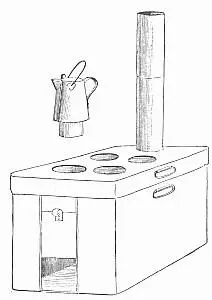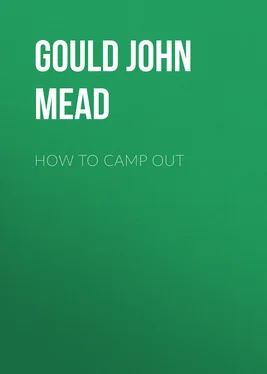
I have used a more elaborate article than this. It is an old sheet-iron stove that came home from the army, and has since been taken down the coast and around the mountains with parties of ten to twenty. It was almost an indispensable article with such large companies. It is a round-cornered box, twenty-one inches long by twenty wide, and thirteen inches high, with a slide in the front end to admit air and fuel. The bottom is fixed to the body; the top removes, and is fitted loosely to the body after the style of a firkin-cover, i.e., the flange, which is deep and strong, goes outside
Конец ознакомительного фрагмента.
Текст предоставлен ООО «ЛитРес».
Прочитайте эту книгу целиком, купив полную легальную версию на ЛитРес.
Безопасно оплатить книгу можно банковской картой Visa, MasterCard, Maestro, со счета мобильного телефона, с платежного терминала, в салоне МТС или Связной, через PayPal, WebMoney, Яндекс.Деньги, QIWI Кошелек, бонусными картами или другим удобным Вам способом.
If your haversack-flap has a strap which buckles down upon the front, you can run the strap through the cup-handle before buckling; or you can buy a rein-hitch at the saddlery-hardware shop, and fasten it wherever most convenient to carry the cup.
A German officer tells me that his comrades in the Franco-Prussian war of 1870-1 had no rubber blankets; nor had they any shelter-tents such as our Union soldiers used in 1861-5 as a make-shift when their rubbers were lost. But this is nothing to you: German discipline compelled the soldiers to carry a big cloak which sheds water quite well, and is useful to a soldier for other purposes: but the weight and bulk condemn it for pleasure-seekers.
In general it is better to put the shelter-tent in the roll, and to keep out the rubber blanket, for you may need the last before you camp. You can roll the rubber blanket tightly around the other roll (the cloth side out, as the rubber side is too slippery), and thus be able to take it off readily without disturbing the other things. You can also roll the rubber blanket separately, and link it to the large roll after the manner of two links of a chain.
I knew an officer in the army, who carried a rubber air-pillow through thick and thin, esteeming it, after his life and his rations, the greatest necessity of his existence. Another officer, when transportation was cut down, held to his camp-chair. Almost every one has his whim.
I never heard of a party exclusively of young men going on a tour of this kind, and consequently I cannot write their experiences; but I can easily imagine their troubles, quarrels, and separation into cliques. I once went as captain of a party of ten, composed of ladies, gentlemen, and schoolboys. We walked around the White Mountains from North Conway to Jefferson and back, by way of Jackson. It cost each of us a dollar and thirty-two cents a day for sixteen days, including railroad fares to and from Portland, but excluding the cost of clothes, tents, and cooking-utensils. Another time a similar party of twelve walked from Centre Harbor, N.H., to Bethel, Me., in seventeen days, at a daily cost of a dollar and two cents, reckoning as before. In both cases, "my right there was none to dispute;" and by borrowing a horse the first time, and selling at a loss of only five dollars the second, our expenses for the horse were small.
In one of my tours around the mountains, a lad of sixteen, in attempting to hold up the horse's head as they were running down hill, was hit by the horse's fore-leg, knocked down, and run over by both wheels.












